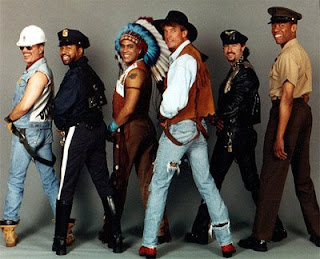"Every man ought to be a macho macho man,
To live a life of freedom, machos make a stand,"
To live a life of freedom, machos make a stand,"
- The Village People, Macho Man
When we were children the men were told when we were hurt to shake it off and be a man. Real men don't cry. Stand up and take it like a man when we fell. As women we were told to be a big girl but that it was "OK" to cry. Men who wanted to cry were called girls names because real men didn't show emotions. When Pearlie came home to see her sisters when they greeted each other they cried and when it was time for them to leave they cried saying goodbye. They cried when they were happy and cried when they were sad.
The review of a new report shows that macho men don't usually seek medical attention or help. "Middle-aged men who strongly idealize masculinity are almost 50 percent less likely than other men to seek preventative healthcare services, according to a study—the first population-based analysis of men’s masculinity beliefs and preventative healthcare compliance—to be presented at the 104th annual meeting of the American Sociological Association..."
 “For masculine men in blue-collar occupations, this research suggests that the masculinity threat of seeking health care is less concerning than the masculinity threat of not performing their jobs,” Springer said. “However, as job status increases among men who have strong masculinity beliefs, the likelihood that they will obtain preventative healthcare declines significantly. These findings provide some insight into the persistent gender paradox in health whereby men have a lower life expectancy at birth relative to women, despite having higher socioeconomic resources.”
“For masculine men in blue-collar occupations, this research suggests that the masculinity threat of seeking health care is less concerning than the masculinity threat of not performing their jobs,” Springer said. “However, as job status increases among men who have strong masculinity beliefs, the likelihood that they will obtain preventative healthcare declines significantly. These findings provide some insight into the persistent gender paradox in health whereby men have a lower life expectancy at birth relative to women, despite having higher socioeconomic resources.”Other than the adoration of women and other men what else does being a macho man get you? Is there no other benefits to being a manly man? There is! An agressive nature help men achieve over others and when men are injured its the most macho of men that fight their way back to fitness. Back in 2007 Science Daily published a report on the upside of the most macho. "It has long been assumed that men are not as concerned and don't take as good of care of their health," Glenn Good, associate professor of educational, school and counseling psychology in MU College of Education, said, "but what we're seeing here is that the same ideas that led to their injuries may actually encourage their recovery." You don't have to be a "Village People" to live a healthy life macho or not.
No comments:
Post a Comment